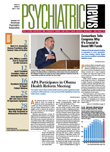APA Medical Director James H. Scully Jr., M.D., was among the physician leaders participating in a health care reform meeting last month with the Obama administration to share insights on how to improve the quality of and access to patient care and strengthen the medical profession.
Physician representatives of about 40 organizations were invited to the meeting, which was led by Ezekiel Emanuel, M.D., Ph.D. He is senior counselor on health care in the White House Office of Management and Budget and is working to develop a program of universal insurance coverage while lowering costs. Other invitees included four deans of medical schools and five chancellors of scientific medical centers.
The meeting, closed to the public and media, produced unofficial consensus priorities that physicians suggested the administration address as part of its overall health care reform effort.
“They wanted an open dialogue and specific recommendations, which they got,” Scully told Psychiatric News.
Scully emphasized to the administration that strong, carefully crafted regulations were needed to implement the insurance parity provisions of the Paul Wellstone and Pete Domenici Mental Health Parity and Addiction Equity Act of 2008. APA has urged expedited issuance of guidelines to clarify how the federal law will complement existing state parity laws and to address the extent of coverage that insurance plans must provide for treatment of mental illness.
The administration used the physician meeting to lay out its goals for health care reform. Emanuel, brother of Obama's chief of staff, Rahm Emanuel, discussed the overarching goals that health care reform advocates will aim to address, including the availability of affordable, quality care for all Americans and controls on the rising costs of health care.
Physicians said they could help meet those goals through changes in the health care reimbursement system. Among the physician consensus priorities was the need to overhaul federal physician payment systems, such as those of Medicare and Medicaid, and to design a funding approach that rewards physicians for providing good outcomes.
“Physicians have to be paid for the time it takes to get to know their patients,” Scully said about the need for reimbursement for cognitive care aspects of treatment.
Physicians also sought changes in federal antitrust law. Clinicians have been unable to meet and cooperate in finding cost-saving approaches to care because they could be charged with undermining competition, thus violating federal antitrust laws.
Loosening antitrust restrictions on collective negotiations or collaborations also could benefit patients, Scully noted, because physicians' close interactions with other physicians could control costs by eliminating redundant and expensive services.
Another area in which physicians urged reform was malpractice liability. They want strong legal protections from malpractice lawsuits for physicians who adhere to established practice guidelines. “Integrated networks” of physicians from various specialties could also generate guidelines providing legal protection from lawsuits for physicians who provide care through a multidisciplinary approach.
Meeting participants also sought federally supported changes in medical education. The federal government could encourage the greater integration of various areas of medicine, according to the physicians, through modifications in graduate medical education that train student doctors how to work together more effectively.
The physicians' forum was a departure from the last federal health care reform approach undertaken by former President Bill Clinton in the 1990s. Emanuel, who served on the ethics section of Clinton's Health Task Force, used the March meeting to obtain physicians' input on reform much earlier than had the Clinton initiative, which was nearly a year old before physicians' views were sought. The higher physician profile in the Obama effort is expected to continue, including plans for more such physician forums as the health care overhaul moves through the legislative process. ▪
